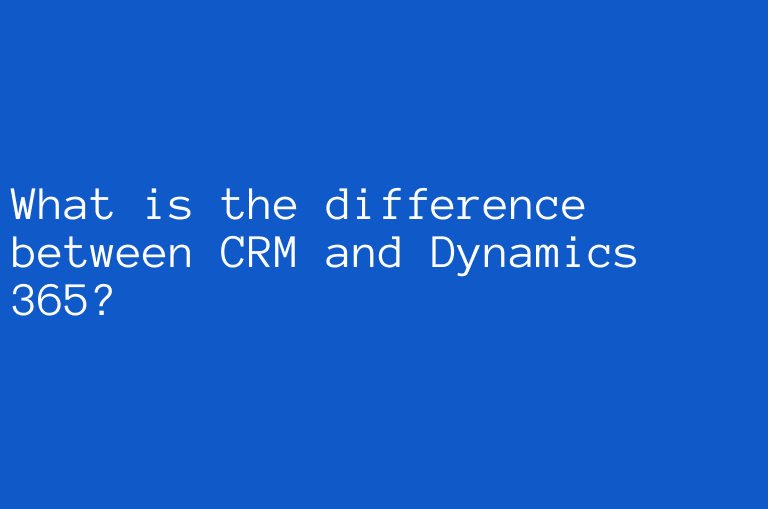What is the difference between CRM and Dynamics 365?
Customer Relationship Management and Microsoft Dynamics 365 are pivotal in modern business operations, yet they serve distinct roles. Understanding their differences is essential for organisations aiming to enhance customer interactions and streamline processes.

Understanding CRM
CRM, or Customer Relationship Management, encompasses strategies and technologies that organisations employ to manage and analyse customer interactions throughout the customer lifecycle. The primary objective is to improve customer service relationships, assist in customer retention, and drive sales growth. CRM systems compile data from various channels, including a company's website, telephone, email, live chat, marketing materials, and social media. They provide businesses with detailed information about customers' personal information, purchase history, buying preferences, and concerns.

Introducing Microsoft Dynamics 365
Microsoft Dynamics 365 is a suite of intelligent business applications designed to deliver superior operational efficiency and breakthrough customer experiences. It enables businesses to become more agile and reduce complexity without increasing costs. Dynamics 365 integrates both CRM and Enterprise Resource Planning (ERP) capabilities, offering a comprehensive solution that connects your entire business.
Key Differences Between CRM and Dynamics 365
-
Scope and Functionality
-
CRM: Primarily focuses on managing customer interactions, sales processes, and customer service. It aids in tracking customer data, managing sales pipelines, and facilitating communication between the business and its customers.
-
Dynamics 365: Offers a broader range of applications beyond traditional CRM. It includes modules for finance, operations, marketing, human resources, and more, providing an all-encompassing platform for various business processes. Microsoft
-
-
Integration Capabilities
-
CRM: While CRM systems can integrate with other business tools, they often require additional effort to connect with ERP systems or other enterprise applications.
-
Dynamics 365: Designed with seamless integration in mind, Dynamics 365 allows for easy connectivity between its various modules and other Microsoft services like Office 365 and Azure. This unified approach ensures data consistency and streamlines workflows across departments. Microsoft
-
-
Customization and Scalability
-
CRM: Traditional CRM systems offer customization options but may have limitations when scaling to accommodate complex business needs.
-
Dynamics 365: Built to be highly customizable and scalable, Dynamics 365 can adapt to the unique requirements of businesses of all sizes. Its modular structure allows organisations to start with what they need and expand as their operations grow. Microsoft
-
-
Artificial Intelligence and Analytics
-
CRM: Standard CRM systems provide basic analytics and reporting features to monitor customer interactions and sales performance.
-
Dynamics 365: Leverages advanced AI and analytics to offer predictive insights, automate routine tasks, and enhance decision-making processes. Features like Microsoft Sales Copilot integrate AI capabilities directly into the sales workflow, improving efficiency and effectiveness. Microsoft
-
-
Deployment Options
-
CRM: Many CRM systems offer both on-premises and cloud-based deployment options, allowing businesses to choose based on their infrastructure and security preferences.
-
Dynamics 365: Primarily a cloud-based solution, Dynamics 365 ensures accessibility, scalability, and regular updates. However, it also offers on-premises deployment for organisations with specific compliance or security requirements.
-

Choosing the Right Solution
When deciding between a traditional CRM system and Microsoft Dynamics 365, consider the following factors:
-
Business Needs: If your organisation requires a solution solely for managing customer relationships, a standard CRM system might suffice. However, if you need an integrated platform that covers various aspects of your business operations, Dynamics 365 would be more appropriate.
-
Growth Plans: For businesses anticipating growth and the need for additional functionalities in the future, Dynamics 365 offers the flexibility to add modules as needed.
-
Budget Considerations: While Dynamics 365 provides a comprehensive suite of tools, it may come at a higher cost compared to standalone CRM systems. Evaluate your budget and the return on investment each option offers.
-
Integration Requirements: If your business relies heavily on other Microsoft products, Dynamics 365's seamless integration can provide significant advantages.
In conclusion, while CRM systems are essential for managing customer relationships, Microsoft Dynamics 365 extends beyond by offering a unified platform that integrates various business processes. Understanding the distinctions between the two will enable your organisation to select a solution that aligns with your strategic objectives and operational needs.
